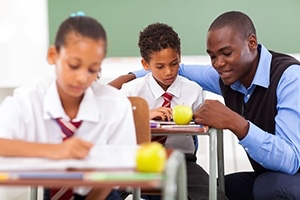A study by economists at Johns Hopkins University and American University found that non-black teachers have significantly lower educational expectations for black students than black teachers do when evaluating the same students.

“This is a big concern since teacher expectations likely shape student success, not just in school, but in life as well,” said co-author Seth Gershenson, an assistant professor at American University’s School of Public Affairs. “It’s important that all teachers maintain and convey high expectations for all students.”
The study illustrates the importance of hiring of a more representative teaching force and allowing for more teacher training to nurture, support and encourage all students, regardless of their innate ability, talents, behaviors, or home circumstances, the study authors said.
The findings highlight the need to better understand how teachers form expectations, what types of interventions can reduce or eliminate biases in teacher expectations, and perhaps most importantly, how such expectations and biases affect the long-run student outcomes, they said.
The study found:
- White and other non-black teachers were 12 percentage points more likely than black teachers to predict black students would not finish school.
- Non-black teachers were 5 percentage points more like to predict their black male students would not graduate high school than their black girls.
- Black female teachers are significantly more optimistic about the ability of black boys to complete high school than teachers of any other demographic group. They were 20 percent less likely than white teachers to predict their student would not graduate high school, and 30 percent less likely to say that than black male teachers.
- White male teachers are 10 to 20 percent more likely to have low expectations for black female students.
- Mathematics teachers were significantly more likely to have low expectations for female students.
- For black students, particularly black boys, having a non-black teacher in a 10th grade subject made them much less likely to pursue that subject by enrolling in similar classes. This suggests biased expectations by teachers have long-term effects on student outcomes, the researchers said.
The research, led by Gershenson and Johns Hopkins professor Nicholas Papageorge, identifies systematic biases in teachers’ expectations using data from a nationally representative survey of U.S. 10th graders. In the study, two teachers per student were asked how much education they expected the student to ultimately complete.
Having two teachers per student was central to the research strategy. Distinguishing biases in teachers’ expectations is difficult, since students who have black teachers may differ from students who have white teachers in systematic ways (e.g., living in different neighborhoods, attending different schools). The researchers eliminated these concerns by comparing the expectations of two teachers — one black and one non-black — for the same student, at the same point in time.
“We found that a non-black teacher is about 30 percent less likely to expect that the student will complete a four-year college degree than the black teacher,” said Papageorge. “This isn’t meant to lay blame, since bias is part of human nature, but it provides a place to start a dialogue between educators, policymakers, parents, researchers, and other stakeholders.”
The study was published March 30, 2016 in The Economics of Education Review. The study was conducted by economists from American University’s School of Public Affairs and John Hopkins University’s Department of Economics.
- Woody Exley
